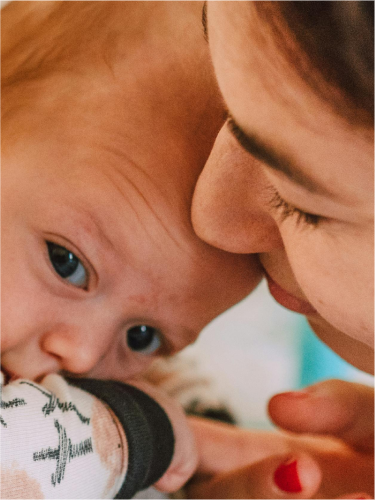Regular member
2. Common ID
Becoming a surrogate opens the door to profound experiences, benefting both the intended parents and you. By engaging in gestational surrogacy, you offer the extraordinary gift of parenthood to someone who cannot conceive naturally.
A surrogate, also known as a gestational carrier, carries a pregnancy for individuals or couples unable to conceive. Unlike traditional surrogates, gestational carriers at Donor Exchanges Surrogacy have no genetic link to the child, ensuring clear boundaries and emotional clarity.
Surrogates are compensated for their commitment and protected legally by bincing agreements with the intended parents, but more than that, they are heralds of hope and joy to aspiring parents.
Typically, surrogates have their own children, enjoyed their pregnancies, and wish to help others start families once their own family is complete.
Genetic Separation: Gestational surrogates have no genetic connection to the child, as their own eggs are not used in the embryo creation process.
Compensation: Surrogates receive compensation throughout their journey, starting even before pregnancy.
Choice in Matching: Surrogates can choose their intended parents, ensuring all matches are mutually agreeable.
Medical Involvement: Injections are part of the IVF process for surrogates, typically described as manageable by those who've gone through it.
Emotional Connection: Surrogates typically do not feel a lasting attachment to the child, often anticipating the moment the parents frst hold their baby.
Our surrogates oflen share a common motivaticn: he desire to help. Reasons fer becoming a surragate include:
Women who have had uncomplicated pregnancies and wish to help others.
Knowing someone affected by infertility can inspire women to become surrogates.
Many surrogates enjoy the emotional reward of helping others achieve their dreams of parenthood.
Surrogate mothers support a diverse group of intended parents, including:
· Heterosexual couples facing infertility challenges.
· Women who cannot carry pregnancies.
· Individuals avoiding genetio conditions in their offspring.
· LGBTQIA+ couples seeking a biological connection with their child.
Surrogates often have the option to express preferences regarding the intended parents they wish to help, whether they are local, national, or interational.
Donor Exchanges Surrogacy's surrogate requirements take into consideration the guicelines put forth by the American Society for Reproductive Medicine (ASRM) and clinic guidelines. Surrogate applicants will also participate in a screening with a social worker and complete psychological testing. Becoming a surrogate requires applicants to be emotionally and mentally ready to enter into a surrogacy jourey to help ensure the most suocessful outcome for intended parents.
Has had uncomplicated pregnancies and deliveries.
Is between 21-42 years of age.
Typically have a Body Mass Index (BMl) of no higher than 33. Calculate My BMl.
Has the support of her family. If married or partnered, the surrogate must have her partner's support.
Has delivered a child of her own and is currently parenting at least one child.
Is willing to travel for IVF process. Please note, often these trips include overnight Stays.
Does not use illegal drugs, smoke cigarettes, or abuse alcohol.
Does not participate in the following government aid programs: cash assistance, welfare, public housing and section 8. All other forms of government assistance will be considered on a case-by-case basis.
Lives in a surrogate-friendly state in the United States (we are very sorry but we cannot accept gestational carriers who reside in Nebraska Or Louisiana.
Has a valid driver's license.
Prospective surrogates must meet rigorous health, lifestyle, and legal standards, ensuring a safe and positive experience for everyone involved:
Health: Surrogates should have had previous uncomplicated pregnancies and deliveries and typically fall within a specifc age and BMI range.
Lifestyle: A supportive home environment is crucial. If married Or partnered, the surrogate's signifcant other must be supportive.
Legal: Surrogates should not be on certain government assistance programs and must reside in surrogate-friendly states.
Compensation varies, but surrogates generally earn between $55,000 and $65,000, inclusive of base fees and additional benefts, reflecting the signifcant emotional and physical commitment involved.
If you feel drawn to surrogacy, Donor Exchanges Surrogacy offers an inclusive, supportive environment to start your journey. With our extensive experience and dedicated team, we ensure every surrogate receives the guidance and support needed to make this life-changing decision. Apply today and take the frst step toward an incredibly rewarding experience.
The number of times you can be a surrogate largely depends on your total pregnancies and deliveries. We typically work with women who have had no more than six previous deliveries, with the surrogacy potentially being their seventh.
Women aged 21 to 42 are eligible to be surrogates. Experienced surrogates may qualify up to age 44.
No, surrogates must have had at least one successful, complication-free pregnancy and delivery.
If a miscarriage occurs, you'll be fully supported by Donor Exchanges throughout the process. Compensation continues through the month of the miscarriage. Any decisions about future surrogacy attempts will be made with medical advice and in agreement with the intended parents.
Should you become pregnant with twins, your contract will be adjusted to reflect the additional responsibilities, and you will receive extra compensation. Most intended parents opt for transferring only one embryo, but surrogates must be medically cleared for a multiple embryo transfer.
















